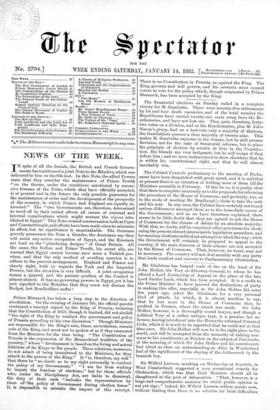Prince Bismarck has taken a long step in the direction
of absolutism. On the evening of January 7th, the official gazette contained a rescript signed by the King of Prussia, declaring that the Constitution of 1850, though it limited, did not abolish "the right of the King to conduct the government and policy of Prussia according to his own discretion." Though Ministers are responsible for the King's acts, these, nevertheless, remain acts of the King, and must not be spoken of as if they emanated from the Ministers for the time being. "The Constitution of Prussia is the expression of the Monarchical tradition of the country," whose " development is based on the living and actual relations of its Kings to the people. These relations, moreover, do not admit of being transferred to the Ministers, for they attach to the person of the King." It " is, therefore, my will " that there be "no doubt as to my right personally to conduct the policy of my Government." " I am far from wishing to impair the freedom of elections," but for those officials who, under the Disciplinary Act, are liable to dismissal, to duty of their oath "includes the representation by them of‘ the policy of Government during election times." It is impossible to mistake the import of this rescript. There is no Constitution in Prussia, as against the King. The King governs and will govern, and his servants must compel voters to vote for the policy which, though originated by Prince Bismarck, has been accepted by the King.






































